Endangered Worlds
A History of Environmentalism in Film
Lafayette College, FAMS 235, Spring 2020
Creative Projects
Congyi Chen
Reflection
For my creative project, I made a five-minute short film. It was a really great experience making it, especially given the current situation of pandemic. Because of the policy of social distancing, I did all the procedures myself. I changed my plan of making the movie for a potential very ambiguous project (like 2002: A Space Odyssey, Stanley Kubrick, 1968) to a project whose intention and core might be easier to understand. There are three parts in the film. The first part is reality, it is at the beginning and the ending of the film where “I” watched Avatar and had a weird dream. There are two parts in the dream, the first part, with Richard Strauss’ “Also Sprach Zarathustra”, it shows the end of a new era and the rebirth of human beings after “coronavirus took away 99 percents of human lives” (2002: A Space Odyssey). The future “me” wake up in the old “me”, and I’m not familiar with my human body any more (which is a similar concept to Avatar, because according to Freud, what we experience and see might be reflected in our dreams). Then is the view in the campus, my own thoughts on it is that this is what I saw when I went back in time in my dream, but it can also be understood as reality. It’s a very beautiful view, but the plastics and waste indicate the damage humans do to Earth. It is beautiful and eerie at the same time, like lots of things, for example, technology and development on Earth. Then I wake up and realize this is just a dream, while it can also be reality, or it is actually reality. I was trying to implement the ideas and concepts of several different movies we watched throughout the semester into the project. I definitely think I was trying to go for the Ecocinema side as I tried to touch on identity/environment/reality which I hope would create different understanding on my film.
Huslen Dashpurev
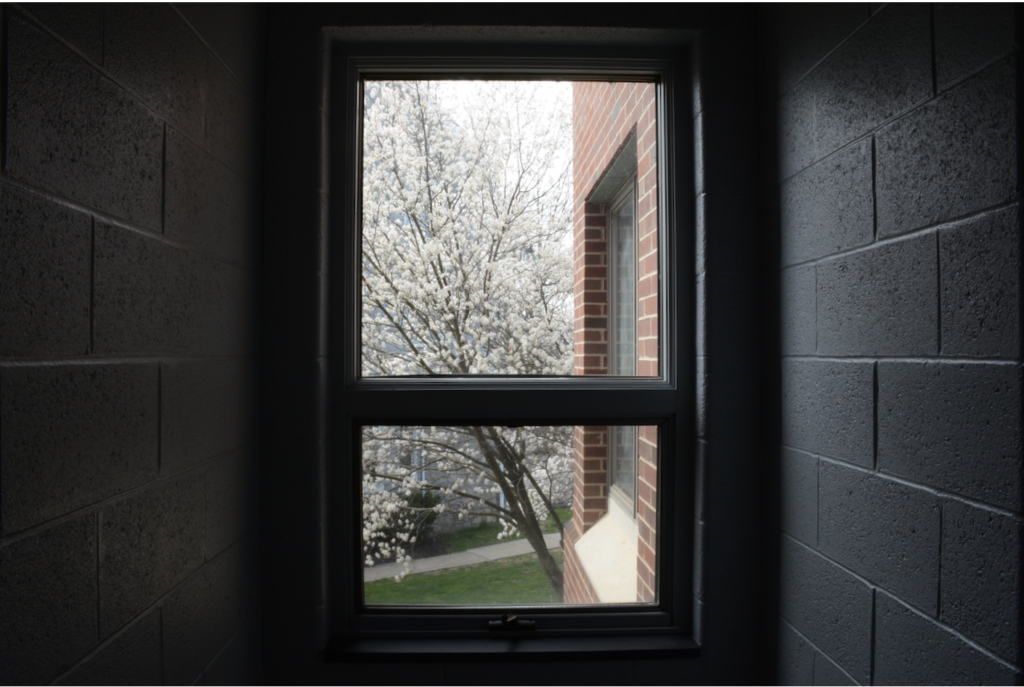


Reflection
With this project, I wanted to play with already existing ideas of what the Earth should look like. When we are children, we automatically draw a sun and grass and flowers when depicting ourselves outside. However, with current events, this naïve understanding has started to change into something more sinister and darker. In each of my photos, I tried to incorporate something that referred to this traditional notion, but progressively become more and more artificial looking.
The first photo is taken in the hallway. I wanted to create a juxtaposition between dark and bright with the outside world looking almost artificially bright. It also tries to make it seem as though the hallway is almost swallowing whatever is outside. The second photo is almost entirely black and white. The most important aspect is the grid lines going through it. I wanted it to look as though the world was being split into square sections literally, similar to how it is easily done theoretically by scientists when studying something. It should see the planet as an exhibition being analyzed. The last picture is entirely artificial; there is no natural aspect to it. The focus on the light should be reminiscent of the sun. I wanted to point to the artificiality the light in the hallway taking on the role of the sun.
Liam Heino
Higher Quality (external).
Reflection
For my creative project, I decided that I would recreate Anthropocene: The Human Epoch (Edward Burtynsky, Jennifer Baichwal, Nicholas de Pencier, 2019), and turn it into a film based around how Covid is impacting environments, and our daily lives. In doing so, I mainly looked at the cinematography as well as the soundtrack, and tried to use those two things to create a meditative tone similar to that of Anthropocene. All of the shots were filmed either in Boston or within a few square miles of where I live. To try to recapture the stylized cinematography of the original I shot most of my footage on my phone on a high frame rate, in slowmotion. This effect along with some added motion to the shots did give some of the shots that stylized feel, but overall my lack of equipment limited what I was able to do. Finding the music was definitely the easier part of the project, as I usually have a piece of relaxing, ambient music while I study. All I had to do was go back through my youtube history and find one song in particular that I thought put me in a meditative mood. While my project didn’t end up looking exactly how I wanted it to, I’m happy with the final result, and I really enjoyed the experience of putting it together.
Tucker Huston
Clever Clara (PDF)
Reflection
For this short story, I just wanted to explore what I would consider a utopic society to look like. A place where the cities blend with the forests and the people are much more connected in terms of community and the environment. I have always been very interested in hunter gatherer peoples because if anything / anyone are the original society of humanity–it is them. And from reading and learning about them, it consistently seems like their way of life–our original way of life and being–is drastically different from the shape our modern day world has taken, to the point where it seems like they are not just different worlds apart but different universes apart. Anthropologists sometimes call hunter gatherer societies the ‘original affluent society’ and I was also inspired by reading Civilized to Death: The Price of Progress by Christopher Ryan. At the same time, I am also keenly aware that it is important to not romanticize and idolize these hunter gatherer societies for somehow being more ‘pure’ than our own society as they are always filled with their own medley of problems and I never want to be associated with an anti-technological or anti-scientific bent. So I tried my hand at envisioning a society that merges the social structure of these early societies (that still continue to this very day in all parts of the world) while blending it with the various cues from contemporary science and medicine and the green technology movement to create–hopefully–an ideal synthesis. It was fun and interesting I suppose but it also makes me aware that will still remain things that can not be so easily solved even in this pseudo ideal ambiguous utopia world. There will like always be problems and conflicts and things to contend with–hence Allajae’s somewhat cynical and dour premonitions and disposition. A big thing I am super interested in is shamans and spirituality. I defo consider myself a deeply spiritual person (sometimes I cry because I am just so overcome with a feeling of connectedness with the world and a sense of being one with the universe (whatever that means)). But it can be hard to verbalize and speak about–people will raise eyebrows and think that you are mentally ill or schizophrenic, at best. And while our society is inundated with religion everywhere everywhere(!) there is not a lot of social discourse nor cultural cues when it comes to talking about spirituality I feel. If a person came forward and was like: Oh, I saw an angel! I talked to God! They would probably be checked into see a few psychiatrists. Which is interesting because obviously in the Ye Olden Dayes these people were heralded as shamans and saints and priests (and sometimes heretics depending on whatever the church(es) hierarchies were feeling that day). It is an interesting switch, the hyper medicalization of society. And while it has brought incredible technological advances and dramatically increased life expectancies, and I give them great kudos for that and I am eternally grateful (I would not be here, living the life I am without modern day medicine) there are still a multitude of elements about this medicalization craze that I am wary and critical of. Hence the utilization of the charmed circles run by saintlike community leaders who learn ‘spells’ and ‘rituals’ to help both their own community and others. So yeah. I really had a hard time writing this story, it did not flow naturally for me and I forced myself to write in an hour. Usually I like to take my time and feel it and be inspired and usually inspiration comes easily for me, to me but this time my passion was dead. For whatever reason. Sometimes we just cannot know.
Lucy Kade
A Language Unlike Our Own
It is back again
today, with tricks and trinkets
propping up its body and the nest,
which stands garish blue midst the rest of everything
At least it is easy to spot so we can keep an eye on it,
anyway we always know when it is coming,
it probably thinks it is quiet but how can you be quiet with
hisses and clacks coming from the mouth,
incessant, and I stare because it was weird at first,
fascinating and strange
but now it is annoying, especially when it brings more like it,
trampling the ground and moving the stones that
we are used to stepping between in the stream.
I do not mind except when it comes close,
clutching a large black insect, almost thrusting it towards me,
and the sounds crowd me, watching like it expects something of me.
I came here to eat but can’t focus,
freaked by the constant tick and hover of the now
multiple insects
It hisses at them like it is communicating with them.
Now I’ve seen how clumsy and feeble it is,
pawing in the grass with a fox,
a fool for being friendly, for what is gained with approach?
I’d rather walk and mingle with the others,
None of us care too much except when something gets at us,
sometimes the something being one of us,
But we are not fools and do not waste our energy so easily,
we use it for what is true and justified.
We already feel like we walk on borrowed land,
and know that the plastic pieces that scratch our ears
do not belong.
We have been hungry lately,
there has been less salmon in the stream and we can see the bottom,
bare and coated in stringy mud
It walks proud through the forest as if it lives here
And I do not know where it comes from
but I know it has an elsewhere home, probably filled with salmon.
I do not like the way it comes here when it likes,
knowing it does not belong
Reflection
I knew that I wanted to focus on animals with my creative project just because that was the unit I found most interesting. I almost wish we had done more with it since I personally felt like I could have spoken about the relationship between humans, nature, and animals for weeks and weeks, as well as whether or not humans can be considered animals. I “cheated” a bit by focusing on animals since I did do the presentation on Grizzly Man (Werner Herzog, 2005), but in my research and creation of the presentation I found that I kept having more and more questions, especially when the topic was opened to Derrida’s “The Animal That Therefore I Am”, which, though challenging, I ended up agreeing with (the parts that I understood, at least).
I struggled a lot with this project, because halfway through I realized that I was diverging too much from Derrida’s text. By anthropomorphizing the bear, the speaker, by giving it a “voice” and have it speak like a human, I was doing the complete opposite of what Derrida suggested about the processes of animals and the way that humans need to respect and not assign human traits to them. Even the use of “I” is something Derrida might say is insulting as full-on consciousness is a human-exclusive trait (from what we can tell). From there I decided to change a few aspects about my poem/monologue- I swapped calling Treadwell “he” for calling him “it”, and changed some of the language to less colloquial and more general in hopes that doing so would be more accurate. Although this was not a perfect solution, it was the compromise that I decided could be best to save my piece from seeming hypocritical. I also at one point was going to make it seem like it was from the perspective of “Bear 141”, or the bear that killed Timothy Treadwell, but eventually took out the parts that did so and left it up to the interpretation of the reader, instead just hinting at the way that bears are “tagged” in the Katmai reservation.
Emma Krasinski
Artificial World: A Look back at my Childhood
I grew up in an artificial world. 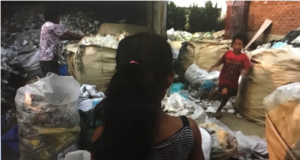
To some, their world is grass, trees, and leaves
Mine was stacked green plastic bags and rubber bands.
You would think
Only rats and dirt would get involved in such a world
But it was my definition of “home.”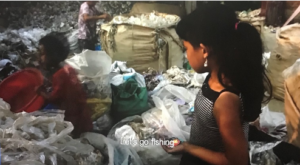
I remember my sister
Rummaging through the crinkling chemicals.
I ran through the forest of filth
Causing a disturbance of her organization.
I was ready to consume dinner
And demanded my desire to fish.
The river was adorned and decorated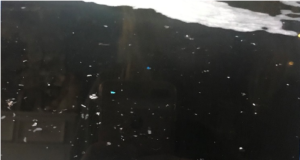
With little pieces of garbage.
How peculiar that nature invades our artificial world like this.
What was plastic and what was fish?
Only the nets determined the outcome
And that was usually somewhere in between.
But the fish were dead.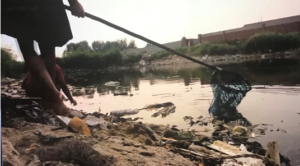
They were always dead.
Nature messed with the artificial world and was punished for it.
I considered it an accomplishment.
Thought I was a top fisher at that age.
Because we unknowingly destroyed their spirits
Prematurely.
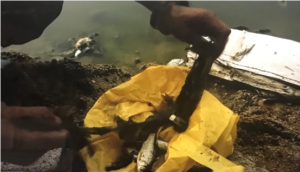
Perhaps maybe we should realize
That fantasy is destructive.
Plastic invades our lives like a disease
And there is no cure
For selfishness.
I did not really need all those things.
Nobody needs all those things.
Time is ticking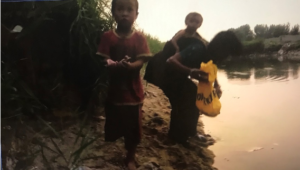
Till our blood becomes plastic
And we become just like the fish.
Dead.
Always dead.
Reflection
I was inspired by this scene in Plastic China (Jiuliang Wang, 2016) for my creative project because it demonstrates the plastic problem in a subtle, but effective way. I’ve observed the children in particular because they seem unphased by the amount of garbage that surrounded their lives. They just went about their lives as normal, fishing and all, because that was their “normal” world when they were growing up. I wanted to emphasize this experience through a flashback poem of the one boy talking about his memories of fishing when he was young. It seemed to be very normal for him to run around in this plastic environment, which he calls his “artificial world” in the poem. He speaks as a young adult now in his twenties and reflects that his childhood was actually a lot darker than he realized.
I started off the poem with an introduction to the boy’s world of artificial materials and his look back on his life. I slowly integrated the scene into the stanzas of the poem as it continued. I begin with the little boy running in the frame to exclaim that he wants to go fishing. The poem then starts to talk about how the boy’s world was so artificial that it felt like nature was the one invading it. The boy reciting the poem realizes that his world that he treasured so much through nostalgia was actually very destructive and harmful. He also realizes that if this does not stop, we are going to become the fish; life that is invading this artificial life. I incorporated screenshots of the major parts of the scene next to the poem, to follow along with that memory aspect of the piece. I really enjoyed taking this scene and expanding its meaning and implication further through reflection and poetry.
Brandon Marin
Humans?
“A land of opportunity and adventure you call it”
But your world is a set course leading to a blocked road
Your spaceships cover the skies,
Yet the nature of your humanity reaches deep horrid pits
You test us to derrive to conclusions
But you’ve failed to answer what fears you most
You conduct your tests in the darkness
What are your hiding, your shame?
We are identitical to you in every way but emotion
You Say
But you trigger us to feel with your abuse
You fear that machines or AI will overcome you
But you fail to realize your self destructive negligence
You ask why we dont know what we are
But how do you live with with what you’ve done?
You become surprised when we rebel and kill
But know that you’ve destroyed
what we originally believed we were
You’ve never saught to live by us
You merely want to control us
Continue what you do, arrogance will eventually fail you
The humanity in us will surpass the so called humanity in you.
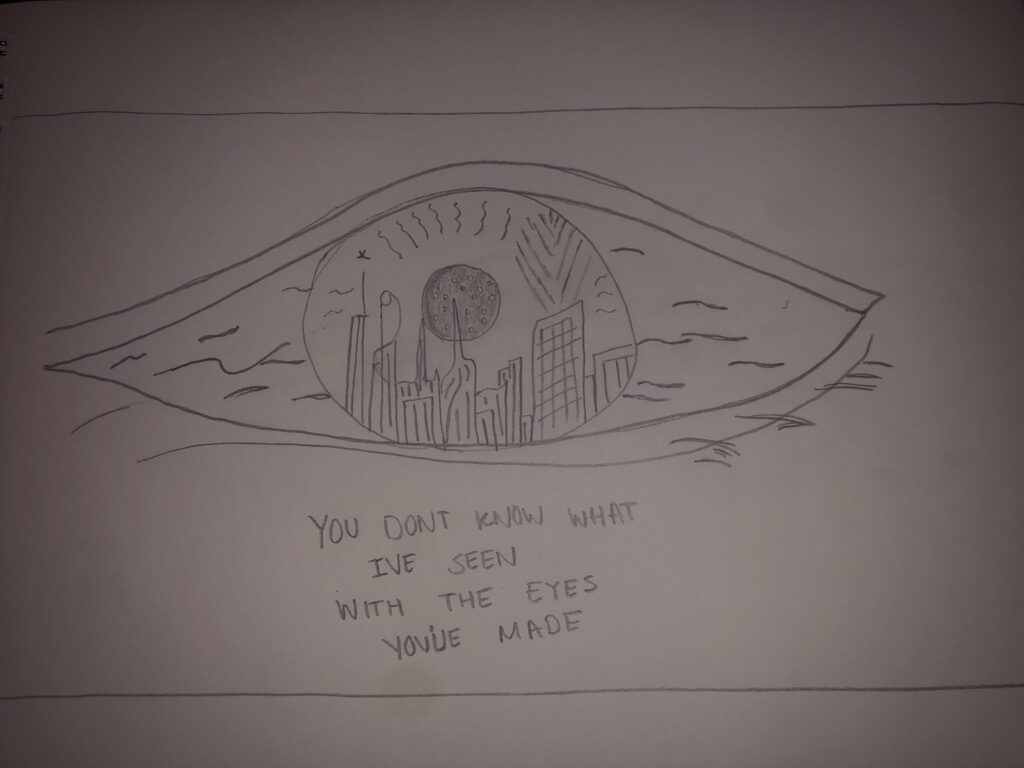
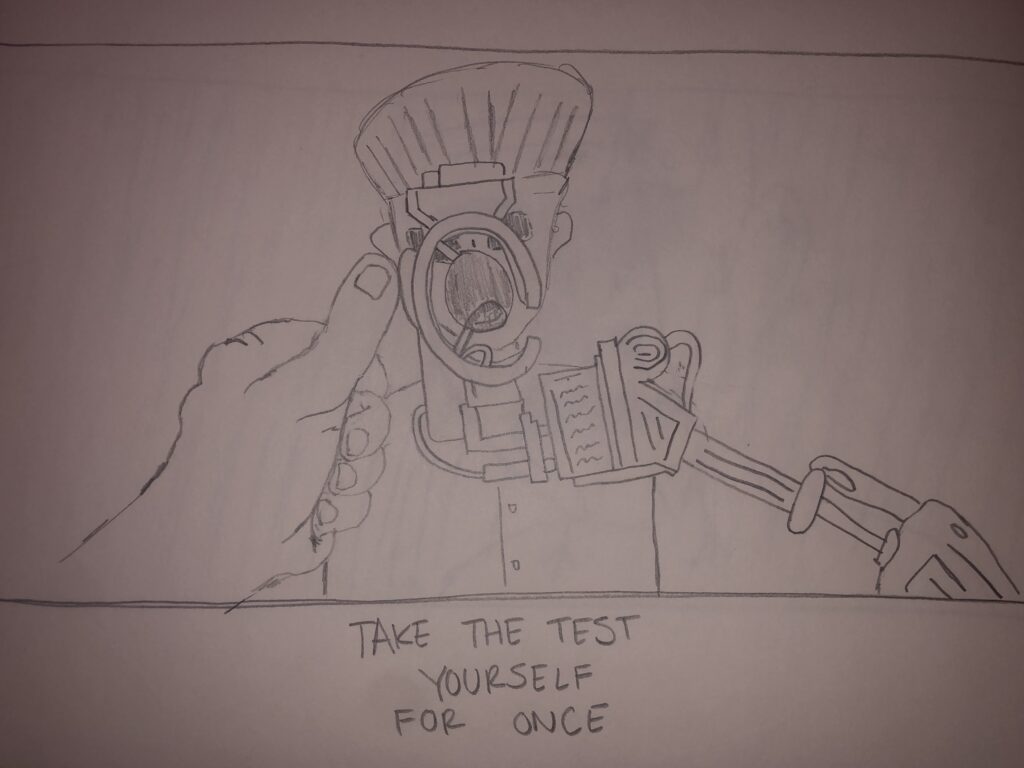
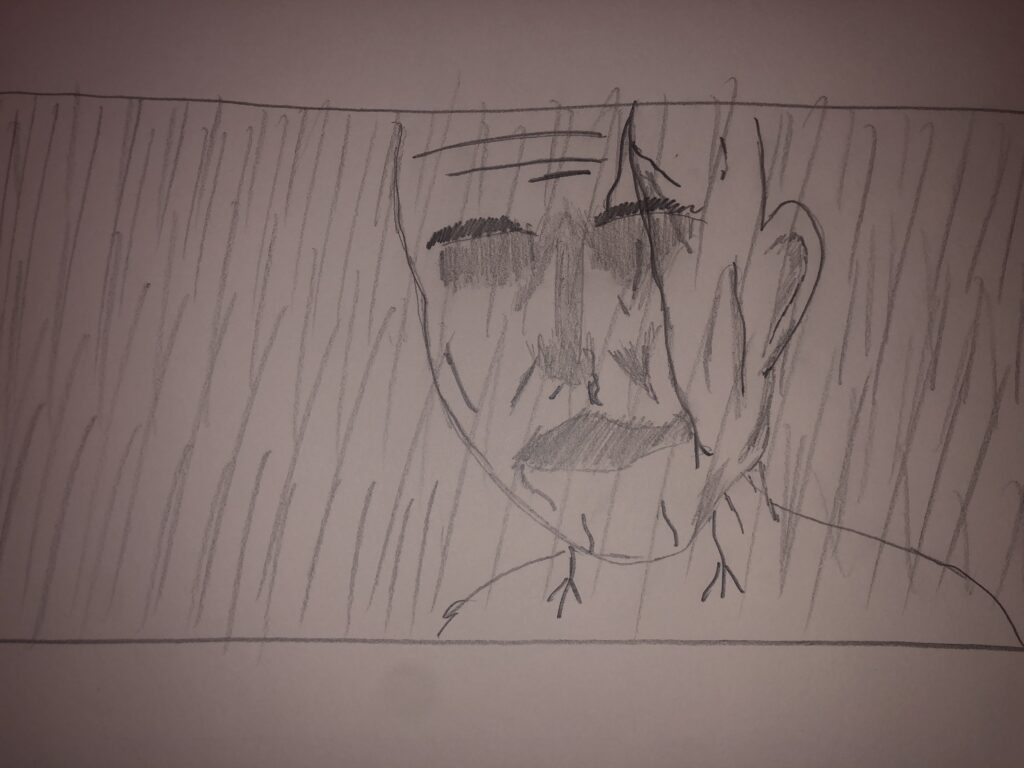
Calvin Sharp
No Title
Reflection
For my creative project, I chose to reflect the famous “Stargate Sequence” scene from 2001: A Space Odyssey (Stanley Kubrick, 1968) in a short musical piece I wrote myself. This scene stuck with me perhaps more than any other we have seen throughout the semester, and I wanted to demonstrate its influence on my thinking this year. I am not classically or casually trained in the piano, so most of the song’s construction was done through multiple hours of practice and free improvisation. The song came together much more abstractly, pieced together solely based on what I heard, stumbled upon, and attempted to refine/mimic. In my mind, this was a good reflection of the power of the Stargate Sequence, in that my appreciation for the scene lies root in its disorienting sense of hope and accomplishment. Lately in my life, I have found an uplifting solace more in the abstract than the actual, which is why 2001 as a whole impacted me so much. Among the slate of movies we watched this semester that were more deliberate and upfront with their environmental message, 2001 presented a less clearly defined purpose, forcing me, as the viewer, to continue to work through complex questions and ideas about the way Dave’s plummet through the cosmos fits within the lofty scope of the film’s story. Simultaneously, this scene blends this abstract, freeform approach with a clear mastery of the available film editing technologies for a movie made in the 1960s. The actual recording of the song proved to be much more difficult than I had initially anticipated, as the quarantine made the resources I had available to me limited. My audio interface is incredibly outdated and poses multiple obstacles whenever I go to record something, so my final setup was done by running my microphone through a loop on my laundry basket and dangling it directly over one of the speakers on my keyboard.